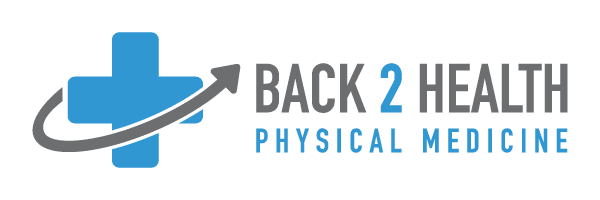Low back pain or cramps in the calves can strike you at any moment. Some muscle spasms set in while you are exercising, while others creep up unnoticed until the pain and tension interrupts your daily life. No matter what type of muscle spasms you are currently struggling with, visiting Back 2 Health Physical Medicine could help you resolve your symptoms.
What is a Muscle Spasm?
When you move, muscles tense and relax to help you dunk a basketball or reach for your alarm clock. Injury and illness can cause nearly any voluntary muscle in the body to tense up and fail to relax again. The tension can be constant, or distinctive throbbing. Twitches, tremors, and similar feelings are a separate problem that needs to be handled separately. Muscle spasms are uncomfortable and usually noticeable, but may go unnoticed for months or even years.
Muscle Spasm Symptoms
Inflamed and tensed muscles can trigger a wide range of disruptive symptoms which include:
- Pain in the back, neck, arms, wrists, calves, feet, or practically any other body part
- Lack of response to stretching, which usually resolves minor muscle cramps
- Involuntary contractions that make your hands or feet jerk
- Tightness and irritation in the muscles
- Loss of movement and flexibility during the spasm
- Cramps that occur during exercise, certain times of the day, or when you are resting
Cause of Muscle Spasms
Any activity that causes your muscles to become overworked can lead to painful but temporary cramps. If your spasms and other symptoms return day after day or mysteriously come and go, the cause could be:
- Alcoholism
- Renal diseases or obstructions
- Dehydration or an electrolyte imbalance
- A wide variety of medications
- Heat, especially if you are exercising in it
- Repetitive activities or muscle strain
- New activities and movements that are unfamiliar to you
- Artery blockages and narrowing that interferes with blood flow to the muscles
- Diabetes and other chronic illnesses
- Restless Legs Syndrome
Muscle Spasm Risks
Muscle spasms are usually not serious themselves, but they can ruin your day. Investing in treatment could help you discover an underlying health issue that you were unaware of before testing. You may be able to avoid most muscle spasms by:
- Stretching fully before exercise and warming up slowly as you begin
- Staying hydrated and try a sports drink to prevent electrolyte issues
- Correcting your posture to reduce strain
- Sleeping on your back and use a pillow designed for proper neck support
- Keeping your chronic conditions under control
- Reporting disruptive side effects from your medications to your doctor
- Checking your nutrient levels to rule out deficiencies in iron, magnesium, calcium, or potassium
Muscle Spasm Treatment Options
For a basic cramp, stretching and rest is usually sufficient. You should be able to solve dehydration and electrolyte problems on your own if they aren’t severe. However, the more severe causes of spasms should be properly treated by a professional at our Goose Creek clinic. We can provide effective treatments like:
- Massage therapy to release knotted muscles and soothe throbbing muscles
- Assisted stretching that relieves cramping in hard to access areas
- Testing to rule out deficiencies and chronic illnesses
- Chiropractic care that realigns the spine to relieve nerve pressure and stop back cramps
- Trigger point injections
We Have Plenty Of Experience With Muscle Spasms
Cramps or tingling that comes and go deserve an investigation. Make an appointment with Back 2 Health Physical Medicine for a consultation if you start experiencing spasms and pain on a regular basis. Discovering the cause could help you enjoy fewer sore calves and less lower back pain.


